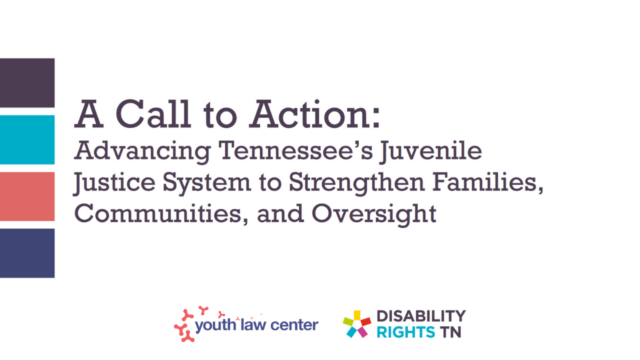
For Release: February 15, 2024
New Report is an Urgent Call to Action for Improving Tennessee’s Juvenile Justice System
Actions to fix Tennessee’s struggling juvenile justice system are long overdue and must include strengthening families, building community connections and ensuring accountability.
A new 30-page report released today on Tennessee’s juvenile justice system, A Call to Action: Advancing Tennessee’s Juvenile Justice System to Strengthen Families, Communities, and Oversight, digs deeper into the current juvenile justice system and offers specific, achievable action steps for how best to improve the struggling system that today is still doing more harm than good for both children and our communities.
Disability Rights Tennessee (DRT) and the Youth Law Center (YLC) again have collaborated on this special report by first asking the question: What would it look like if Tennessee’s juvenile justice system truly focused on strengthening families?
Advocacy groups will continue to push the state legislature over the next weeks to look carefully at the reports 8-action steps and act quickly on improving Tennessee’s systems. Investing in family and community-based solutions is an approach to juvenile justice that has been endorsed by parties as varied as the American Conservative Union and the ACLU, and that has already paid dividends in our state—Tennessee’s youth crime rate has dropped 18% in the last decade of reforms, and even more in Shelby and Davidson County.
Lisa Primm, Disability Rights Tennessee’s Executive Director stated, “If we truly want to see our children develop into healthy and productive members of our communities, we must ensure that the programs serving these young people, including our juvenile justice system, are focused on connecting youth and families to community-based services and solutions.”
“The best way to keep youth safe from abuse in facilities is to ensure they never go to one. Yet, the Tennessee Department of Children’s Services continues to prioritize building facilities over strengthening families, institutional placements over community-based services, avoiding public scrutiny over transparency, and preserving provider contracts over protecting the young people in their custody,” A Call to Action states.
As the report points out: When support and community-based connections increase for youth in the juvenile justice system, positive outcomes are proven to increase for these young people and their families, as well as make our communities safer.
“Tennessee has an opportunity to reorient its juvenile justice system to promote strong families and safe communities,” stated Jasmine Miller, a Nashville-based attorney with the Youth Law Center and one of the authors of the report.
“Our juvenile justice system still has problems but these can be fixed. We put forth practical, concrete action steps that can be taken to increase family engagement, expand community resources, and keep youth in our juvenile justice system safe from harm, all of which promote safer communities and result in a decrease in youth crime rates,” Miller added.
Improving Tennessee’s juvenile justice system doesn’t just ensure the health of our young people and communities but comes with a way to reduce spending that could be used in other areas. In fact, placing one youth at Wilder Youth Development Center costs the state $1,632.24 per day, or almost $600,000 a year for each youth.
Youth and families all over Tennessee benefit from strong relationships and support from their community—whether it’s connections to sports and extracurriculars, schools, faith communities, mental health services, youth jobs programs, or simply having a listening ear in challenging times. Youth in the juvenile justice system, who have often experienced childhood trauma and are disproportionately Black youth with disabilities, need to be plugged into these supports, too. Tennessee can build on successful existing models within the state to help youth and families expand their support networks, instead of spending money on facility-based strategies that prevent youth and families from connecting.
All youth need to be connected to their families and their communities. All families need support in times of crisis. Our state has an opportunity to leverage Tennessee’s two greatest assets—our families and communities—to solve the problems within Tennessee’s juvenile justice system and improve community safety for all. There’s no better time to start than today.
For a copy of the Executive Summary with a listing of the Action Steps and the full Report, go to the Disability Rights Tennessee or Youth Law Center websites.
Both organizations are available for comment. For more information, contact:
Lee Sherwood at Disability Rights Tennessee, email: LeeA@
Jasmine Miller at Youth Law Center, email: JMiller@YLC.org; cell/text: 615.480.7992
-end-
Disability Rights Tennessee (DRT) is the designated Protection & Advocacy (P&A) agency for Tennessee. DRT provides free legal advocacy services to protect the rights of Tennesseans with disabilities, and has broad access authority to monitor facilities, including juvenile justice facilities, and to investigate allegations of abuse and neglect. www.
The Youth Law Center is a non-profit law firm that advocates to transform foster care and juvenile justice systems across the nation so that every child and youth can thrive. For over 40 years, Youth Law Center has pursued policy and advocacy to protect the rights of youth in the child welfare and juvenile justice systems and to promote positive youth connections to community and family. The Youth Law Center is headquartered in San Francisco, California, with staff in Tennessee. www.YLC.org.
